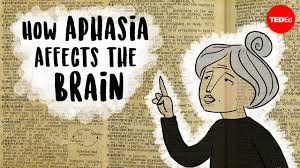(单词翻译:单击)
Language is an essential part of our lives that we often take for granted.
语言是生活中非常基本的部分,我们经常会觉得它的存在是理所应当的。
With it, we can communicate our thoughts and feelings,
有了它,我们可以交流我们的思想和感情,
lose ourselves in novels, send text messages, and greet friends.
沉浸在书本里,发送短信,向朋友打招呼。
It's hard to imagine being unable to turn thoughts into words.
很难想象如果我们不能把想法变成语言时会是什么样。
But if the delicate web of language networks in your brain became disrupted by stroke, illness, or trauma,
但是如果大脑中脆弱的语言网络被中风、疾病或者外伤所损坏了,
you could find yourself truly at a loss for words.
你会发现自己真的哑口无言。
This disorder, called aphasia, can impair all aspects of communication.
这种叫做失语症的病症,可以阻碍所有的交流方式。
People who have aphasia remain as intelligent as ever.
失语症患者患病后智商不变。
They know what they want to say, but can't always get their words to come out correctly.
他们知道自己想说什么,但是不能每次都准确无误的说出。
They may unintentionally use substitutions called paraphasias,
他们可能会不经意的用错词语,
switching related words, like saying 'dog' for 'cat,' or words that sound similar, such as 'house' for 'horse.'
像用“狗”代替“猫”一样用相关联的词替换,或者是听上去相似的词,例如house说成horse
Sometimes, their words may even be unrecognizable.
有些时候他们说的词语甚至不被认知。
There are several types of aphasia grouped into two categories:
失语症被分为几种,归属于两大类:
fluent, or receptive, aphasia and non-fluent, or expressive, aphasia.
流畅的、或者善于倾听的失语症,和不流畅的、表达类的失语症。
People with fluent aphasia may have normal vocal inflection but use words that lack meaning.
患有流畅失语症的人有正常的语调变化,但是用的词没有任何意义。
They have difficulty comprehending the speech of others and are frequently unable to recognize their own speech errors.
他们无法理解别人在说什么,也经常时常无法找出自己语句里的错误。
People with non-fluent aphasia, on the other hand, may have good comprehension
另一方面,非流畅型失语症患者,或许有好的理解能力,
but will experience long hesitations between words and make grammatical errors.
但是会说话时出现长时间的停顿以及语法错误。
We all have that tip-of-the-tongue feeling from time to time when we can't think of a word,
我们都有过那种话到嘴边,却找不到适合的词的感觉,
but having aphasia can make it hard to name simple, everyday objects.
但是患有失语症意味着连简单的日常生活用品都无法表达。
Even reading and writing can be difficult and frustrating.
连阅读和写作都会变得困难和沮丧。
So how does this language loss happen?
那么这个失语症是怎么发生的呢?
The human brain has two hemispheres.
人的大脑里有两个半球。
In most people, the left hemisphere governs language.
我们知道大部分人的左脑负责语言。
We know this because in 1861, the physician Paul Broca
这要归功于1861年一位叫做保罗·布洛卡的内科医生
studied a patient who lost the ability to use all but a single word, 'tan.'
研究了一名只能说tan这一个词的病患。
During a postmortem study of that patient's brain,
通过对他的大脑的尸检,
Broca discovered a large lesion in the left hemisphere now known as Broca's area.
布洛卡发现了患者左脑有一大块区域受到了损伤,现在这一区域被称为布洛卡区。

Scientists today believe that Broca's area is responsible in part for naming objects
现在,科学家发现布洛卡区负责给物体取名字
and coordinating the muscles involved in speech.
并且协调说话用的肌肉。
Behind Broca's area is Wernicke's area near the auditory cortex.
在布洛卡区的后面是威尔尼克区,靠近听觉皮质。
That's where the brain attaches meaning to speech sounds.
这里是大脑把意思和声音所联系起来的地方。
Damage to Wernicke's area impairs the brain's ability to comprehend language.
威尔尼克区受伤会干涉到大脑理解语言的能力。
Aphasia is caused by injury to one or both of these specialized language areas.
失语症就是由于二者之一或全部受损产生的。
Fortunately, there are other areas of the brain which support these language centers and can assist with communication.
幸运的是,大脑里还有别的地方支持着这两个中心区域,同时可以帮助交流。
Even brain areas that control movement are connected to language.
甚至有些控制运动的大脑区域都和语言有联系。
FMRI studies found that when we hear action words, like 'run' or 'dance,'
功能性磁共振成像发现了当我们听到动作词,例如“跑”或“跳”,
parts of the brain responsible for movement light up as if the body was actually running or dancing.
大脑中负责控制运动的部分会亮起来,好像身体真的在跑步或者跳舞一样。
Our other hemisphere contributes to language, too, enhancing the rhythm and intonation of our speech.
我们右脑半球也对语言有贡献,它加强我们讲话时的节奏和声调。
These non-language areas sometimes assist people with aphasia when communication is difficult.
当交流十分困难的时候,这些非语言区域有时也会帮助失语症患者。
So how common is aphasia? Approximately 1 million people in the U.S. alone have it,
那失语症有多常见呢?在美国,大约有一百万人患有这种疾病,
with an estimated 80,000 new cases per year.
估计每年还会新增八万名病患。
About one-third of stroke survivors suffer from aphasia
中风活下来的人里面大约有三分之一被失语症所折磨,
making it more prevalent than Parkinson's disease or multiple sclerosis, yet less widely known.
这让它比帕金森综合症和多发性硬化症更加普遍,但是知道的人却更少。
There is one rare form of aphasia called primary progressive aphasia, or PPA,
有一种罕见的失语症叫做原发性进行性失语症,简称PPA,
which is not caused by stroke or brain injury,
它不是由中风或者大脑受损引起的,
but is actually a form of dementia in which language loss is the first symptom.
而实际上是失智症的一种表现,语言能力退化是失智症的第一症状。
The goal in treating PPA is to maintain language function for as long as possible before other symptoms of dementia eventually occur.
治疗PPA的目的是让患者在其他症状最终出现之前,尽量长时间的保持语言能力。
However, when aphasia is acquired from a stroke or brain trauma,
如果失语症是由大脑受损或中风引起的,
language improvement may be achieved through speech therapy.
语言治疗或许可以提高语言能力。
Our brain's ability to repair itself, known as brain plasticity,
我们的大脑有自我修复的能力,被称之为大脑的可塑性,
permits areas surrounding a brain lesion to take over some functions during the recovery process.
在大脑受伤区域自我修复的过程中,这使得它周围的部分行使部分功能。
Scientists have been conducting experiments using new forms of technology,
科学家们在用新的技术开展实验,
which they believe may encourage brain plasticity in people with aphasia.
希望达到增强失语症患者大脑可塑性的目标。
Meanwhile, many people with aphasia remain isolated,
现在,许多失语症患者依然与世隔绝,
afraid that others won't understand them or give them extra time to speak.
他们怕别人不理解他们在说什么,或者不给他们多一点时间去表达。
By offering them the time and flexibility to communicate in whatever way they can,
通过付出一些时间,用他们可以做到的方式灵活的交流,
you can help open the door to language again, moving beyond the limitations of aphasia.
你可以帮助他们重新打开语言的大门,超越失语症的限制。


